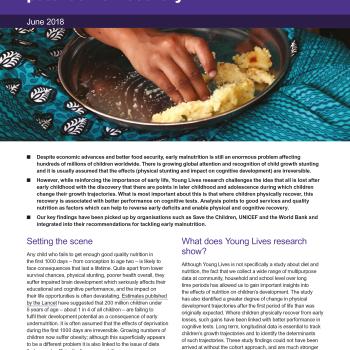
This Young Lives impact case study details Young Lives' unique findings on nutrition, growth and the potential for recovery. For related impact stories, please follow us on Twitter @yloxford.
In overview:
Despite economic advances and better food security, early malnutrition is still an enormous problem affecting hundreds of millions of children worldwide. There is growing global attention and recognition of child growth stunting and it is usually assumed that the effects (physical stunting and impact on cognitive development) are irreversible.
However, while reinforcing the importance of early life, Young Lives research challenges the idea that all is lost after early childhood with the discovery that there are points in later childhood and adolescence during which children change their growth trajectories. What is most important about this is that where children physically recover, this recovery is associated with better performance on cognitive tests. Analysis points to good services and quality nutrition as factors which can help to reverse early deficits and enable physical and cognitive recovery.
Our key findings have been picked up by organisations such as Save the Children, UNICEF and the World Bank and integrated into their recommendations for tackling early malnutrition.

This Young Lives impact case study details Young Lives' unique findings on nutrition, growth and the potential for recovery. For related impact stories, please follow us on Twitter @yloxford.
In overview:
Despite economic advances and better food security, early malnutrition is still an enormous problem affecting hundreds of millions of children worldwide. There is growing global attention and recognition of child growth stunting and it is usually assumed that the effects (physical stunting and impact on cognitive development) are irreversible.
However, while reinforcing the importance of early life, Young Lives research challenges the idea that all is lost after early childhood with the discovery that there are points in later childhood and adolescence during which children change their growth trajectories. What is most important about this is that where children physically recover, this recovery is associated with better performance on cognitive tests. Analysis points to good services and quality nutrition as factors which can help to reverse early deficits and enable physical and cognitive recovery.
Our key findings have been picked up by organisations such as Save the Children, UNICEF and the World Bank and integrated into their recommendations for tackling early malnutrition.

